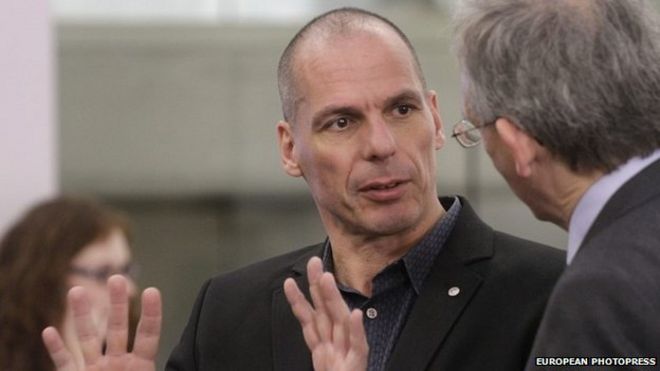Greece: 'Big, big problems' for debt deal
Greece: 'Big, big problems' for debt deal
- 24 April 2015
- Business

Eurogroup head Jeroen Dijsselboem has warned that "big, big problems" need to be solved before any Greece debt deal can be agreed.
He was talking after a strained meeting between eurozone finance ministers and Greek government officials in the Latvian capital of Riga.
Ministers are trying to agree a deal to help Greece meet its debt repayments.
It must repay its creditors nearly €1bn (£720m) next month, and is struggling to raise the money.
Earlier this week, the government asked its public sector bodies to hand over any reserve cash to help make the payment.
Athens is also keen to secure the next tranche of funds from its main creditors - the European Union, the European Central Bank and the International Monetary Fund - totalling €7.2bn.
'No expectations'
"It was a very critical discussion," said Mr Dijsselbloem after the talks ended with little sign of progress.
"A comprehensive and detailed list of reforms is needed... and a comprehensive deal is necessary before any disbursement can take place.
"We are all aware that time is running out."
Similar frustrations were expressed by the European Commissioner for the euro, Valdis Dombrovskis.
"Progress in technical negotiations has not been sufficient to reach any conclusion during this Eurogroup here in Riga," he said.
Eurozone ministers are waiting for Athens to present a detailed package of economic reforms to improve the country's finances, which they have made a condition of further support.
'Only option'
Greek Finance Minister Yanis Varoufakis moved to calm fears that a deal may not be concluded quick enough by focusing on the positive.
"We agreed that an agreement will be difficult but it will happen and it will happen quickly because that is the only option we have," he said.
Earlier on Friday, before the Eurogroup meeting, Mr Varoufakis wrote a blog postsaying Athens and its creditors "agree on much", namely that Greece's tax and pensions system, as well as its labour market, need fundamental reform. However, he said his government and its creditors did not agree on how best to implement this reform.
Greece's new left-wing government Syriza is in a difficult position - it is under intense pressure from its creditors to cut spending and raise tax revenues, but was voted in on a mandate to end the austerity measures imposed by the EU, the ECB and IMF.
Markets are concerned that if the government fails to come up with a package acceptable to its creditors, Greece may default on its debts and, ultimately, be forced to give up the euro.

Analysis: Andrew Walker, economics correspondent, BBC World Service
More deadlines loom for Greece. Back in February the aim was to have a set of economic policies agreed with its lenders by the end of April. There's little chance of that happening.
Then there is the end of the extension to the European part of the bailout at the end of June. Of course there have been missed deadlines in his saga before and European governments could always choose to give Greece more time.
There is a limit of course. At some stage the Greek government will run out of funds to pay its bills, unless it gets more help.
And the European Central Bank (ECB) could at some stage pull the plug on emergency support for the country's banks.
But then again, ECB officials have said a government default doesn't necessarily mean the banks are bust.
So the conclusion? This cloud of uncertainty will probably hang over Greece for a long time yet. bbc
Comments